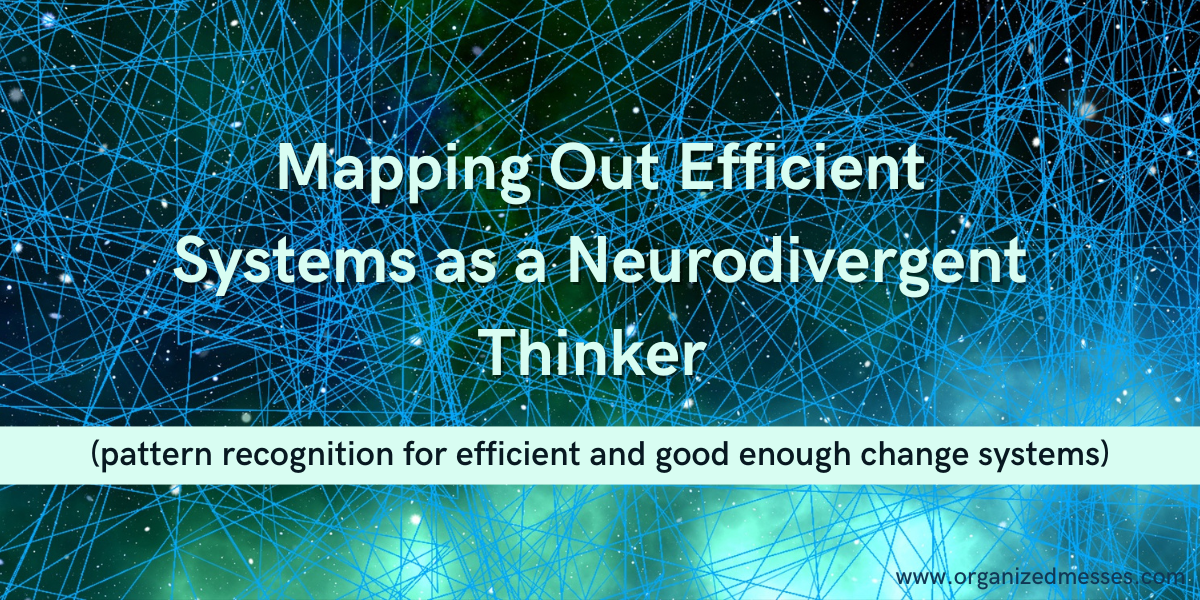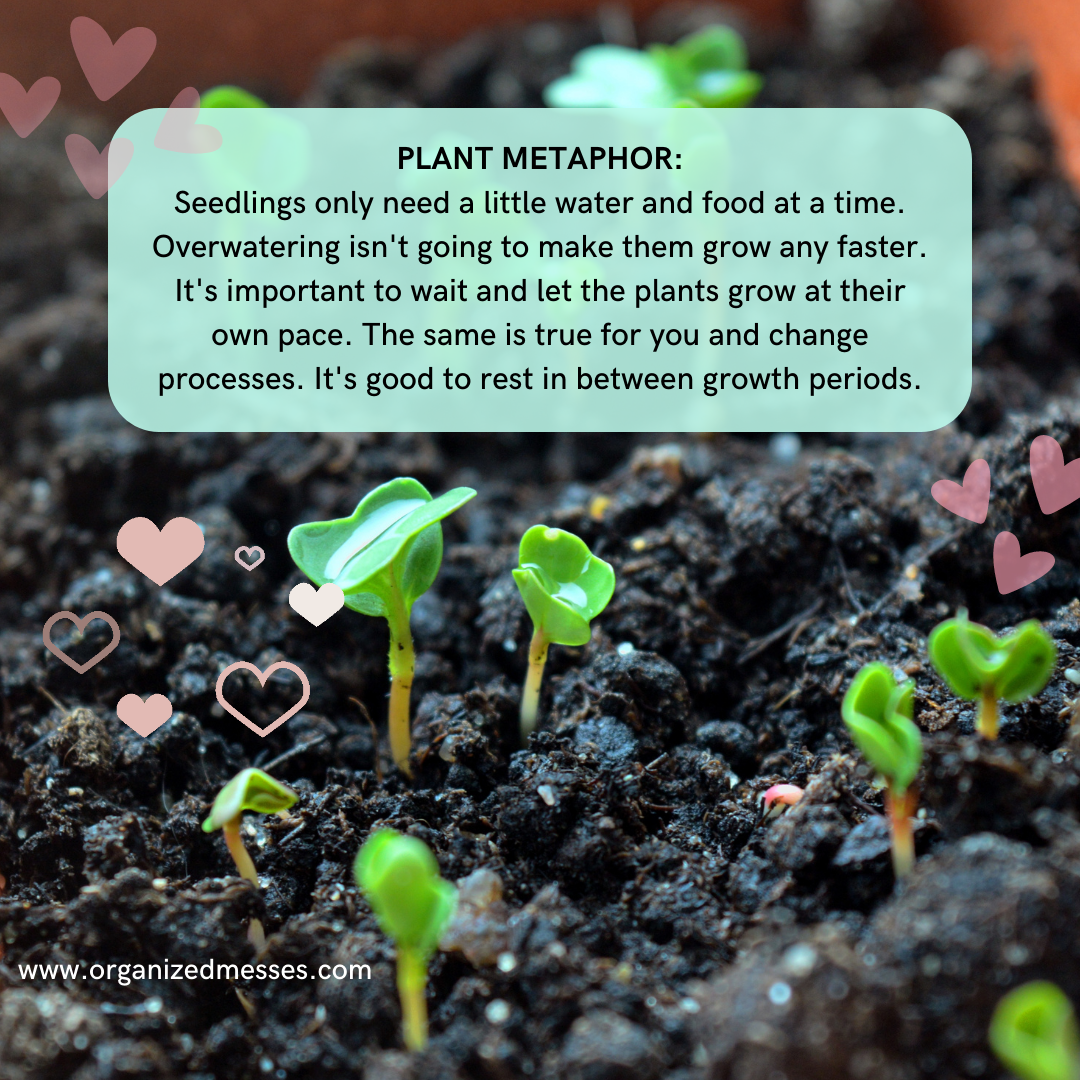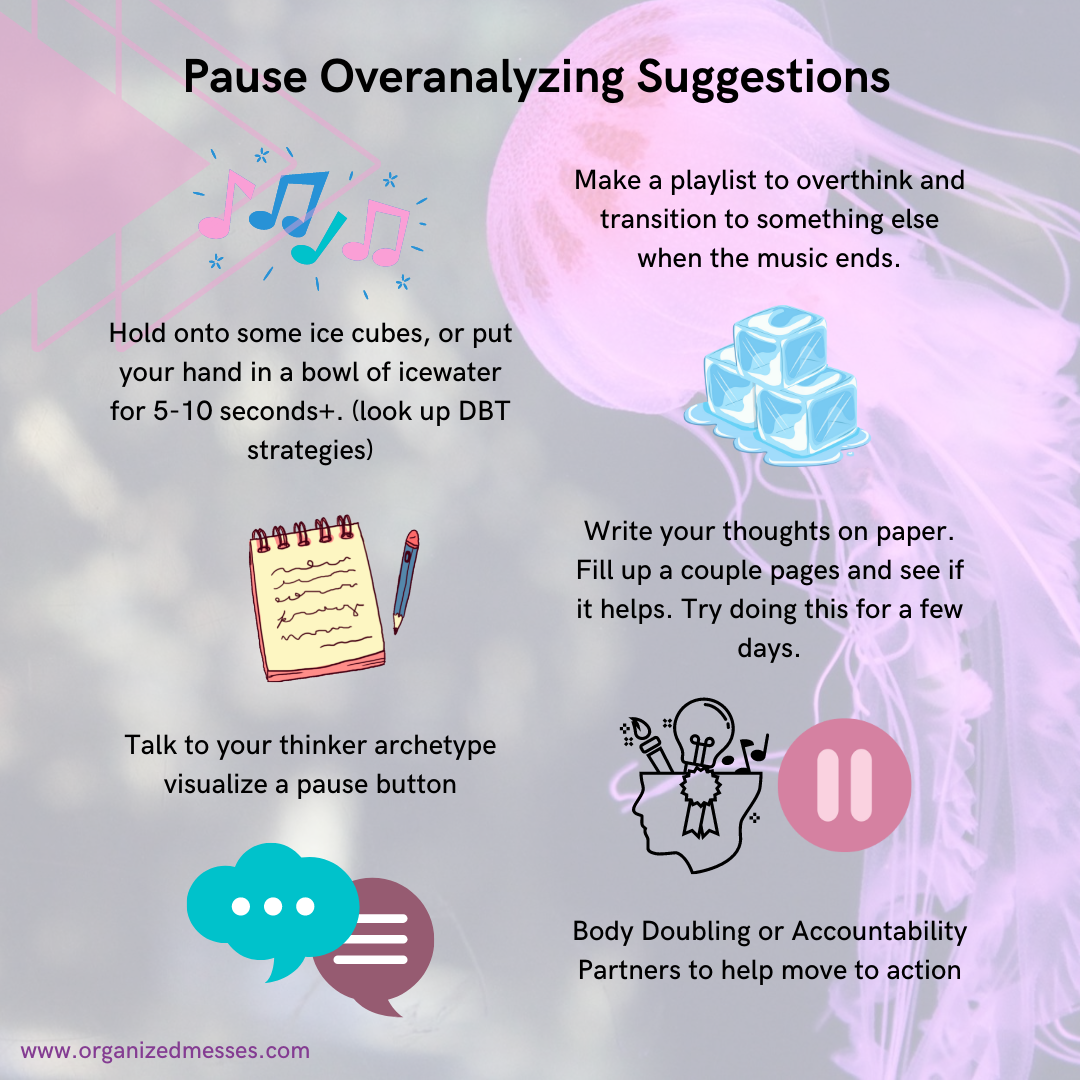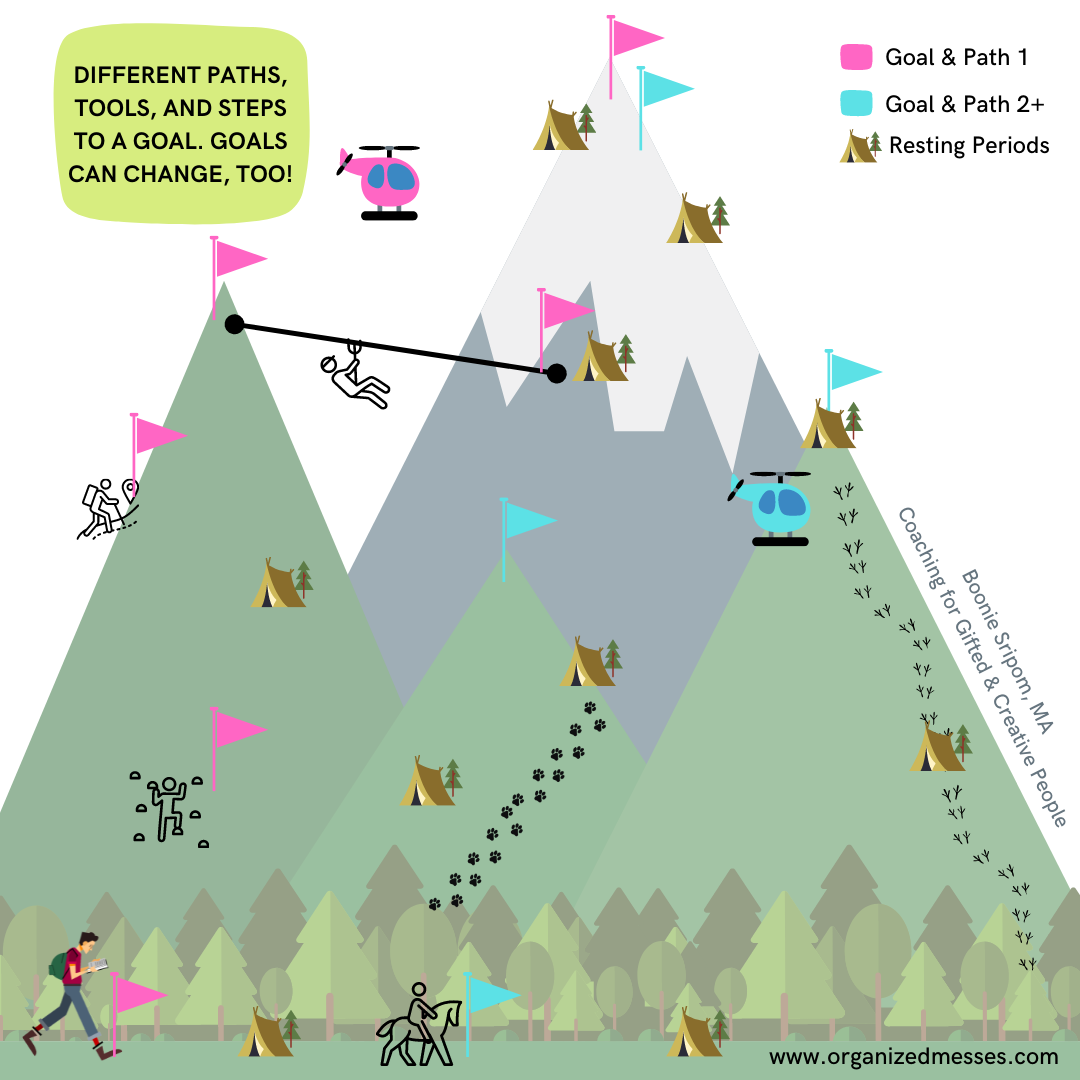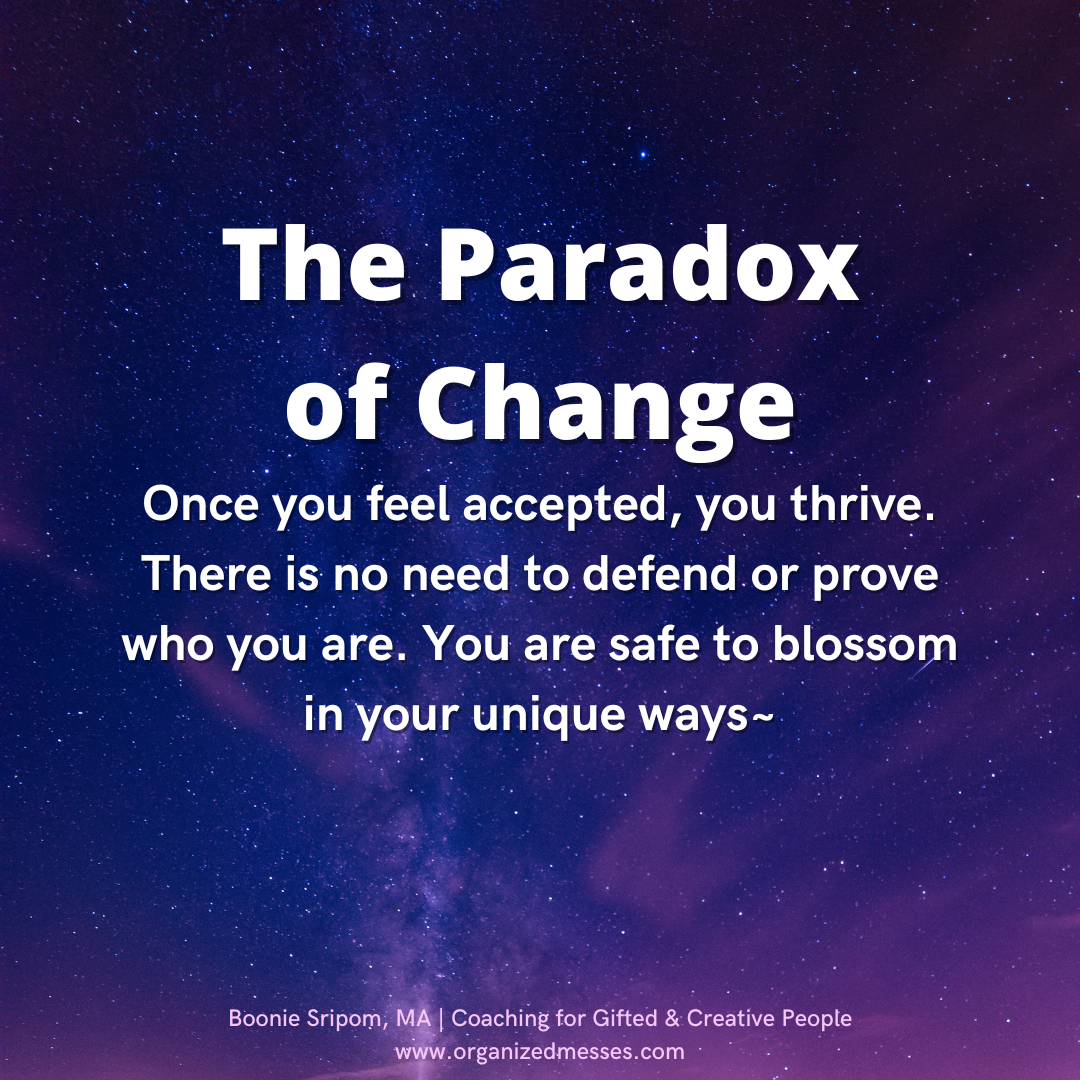Welcome Fellow Divergent Thinker or Loved One of a Divergent Thinker~
Thinking about change systems and cycles is a special interest of mine, and I’ve wanted to find a way to start sharing the complex map of how change can and may happen for the differently wired individual. You may start at different places of this reference, and that’s awesome. It’s awesome that you have insight into where you’re at and the data points mentioned.
INSIGHT helps with moving from the abstract to the concrete. As rationals and people comfortable with staying in the realms of thoughts and concepts, we need something else to transition out of our heads and into the existing world. Please consume this information at your leisure. Take nibbles of it and come back after letting it process. Take notes on what speaks to you, and what doesn’t make sense or work. It’s all important in figuring out what works for you.
This reference can be applied to different areas of life: relationships, personal development, self-care, chores, academic skills, and the creative process. Many times we seek to understand the WHY before things suddenly click into action and change. I hope some of these notes help with your conceptualization of change and being more compassionate with your unique process of transformation.
Change Processes — Mapping the Journey
Visualize your history with change, important dates, people, and any patterns that may come from tracking the information. A timeline can help.
Gather Data
We’re gonna need information to assess where you’re coming from, identify patterns, and establish a reference point. When thinking about change in a specific area of life, how long has it been like this? Suggestions include:
A visual timeline, summary, list, or description of your life related to this.
This process helps with executive function skills: taking information from longterm memory and sorting it chronologically or thematically
TALK IT OUT. Many times we need to think out loud. As we share externally, ideas sort and can build into a story with context and background. Many times neurodivergent people are shut down or dismissed so our stories are not heard in their entirety.
Ask people you trust to describe your relationship with this change, and any patterns they’ve noticed. Ask them to be neutral and include objective contexts to help understand what they see.
A recent snapshot helps, too. Milestones in life can be catalysts for difficult transitions. It’s normal, and it can be an opportunity to experiment with different strategies.
Perform Experiments
Treat change like an experiment. We don’t know what will work unless we try and gather data to analyze the patterns! — Boonie Sripom
When trying to figure out how to change, we need experiential data to determine if something works or not. To the frustration of those around us, and ourselves, this process can look very chaotic. Sometimes it looks like we are going in circles. If we continue doing the same things but they are not beneficial, it’s important to pause and examine what’s happening.
Even adopting beneficial changes can take practice and experimentation. You’ve spent a lifetime or X amount of time doing things a certain way. It makes sense that it will take time to adjust to doing something new. You’re building new neural networks and slowly figuring out if it’s something you want to keep doing.
Pick something to try.
Give it a timeframe that YOU want to do.
Rest and analyze.
Please note some things we do could help us grow in different parts of life. Experiments allow us to try things we did in the past, or heard of when we weren’t ready. When you feel ready, give something a try and gather that data!
Ask trusted loved ones to share observations of you as well. This helps with perspective building in the present.
(If you don’t trust anyone, document your journey privately. I used my YouTube videos to think out loud as I went through cycles of change. When I look back, I can see how much I’ve grown and the resiliency I cultivated.)
Rest
I am using plant and exercise metaphors to help explain why rest is important.
PLANT METAPHOR: Seedlings only need a little water and food at a time. Overwatering isn't going to make them grow any faster. It's important to wait and let the plants grow at their own pace. The same is true for you and change processes. It's good to rest in between growth periods.
Plant Metaphor: Plants only need a certain range of water and food. If you give too much water or too much food, the plant could die, get root rot, or stop taking in the extra nutrition. There is a limit a plant can take, and the same goes for you. Give yourself time to absorb the new habit and change.
Many people can be impatient with change and want to go go go because they’re ready. Being ready is important! Doing the work and accepting the process of change is very important. Your mind, body, and spirit are all adapting to a new way of being. Give yourself time to develop congruence within these parts of you.
Exercise Metaphor: Power athletes tear muscles working out and participating in their sport. There is a huge strain on the body when performing and exercising. In order to grow healthily and prevent harm to the body, athletes rest in between workouts, games, and meets. If an athlete pushes their body when they should be resting, there could be irreparable damage. Conscientious working out also means intentional rest and healing to become stronger and build resiliency.
Analyze Data
While resting and after resting, it’s time to analyze. What happened? Were you able to implement changes? Even a little bit? What were the specific contexts for small successes? What were specific contexts for hardships? Did things stay the same?
YOU HAVE TO ANALYZE IT. Looking at yourself from a bird’s eye view AFTER performing tasks gives us access to metacognition, another executive function skill.
We are good at analyzing ourselves. I am certain almost every neurodivergent person has analyzed their situations and some patterns of existence. This time, we are analyzing with a new perspective. This new perspective is in terms of change cycles and self-compassion.
If we want to change, we must identify what happened. Consider it another short story about you. Step by step, what happened? If we don’t know what happened, we may repeat the cycle.
Think of one variable at a time to see what contributes to repeated cycles.
Overanalyzing OOPS
Ways to pause overanalyzing. Make a playlist to overthink and stop when the music ends. Hold on to ice cubes for 5-10 seconds, look up DBT strategies. Write your thoughts on paper and see if it helps. Talk to your overthinker archetype and pause. Body double or accountability partners can also help~
There are limits to this superpower! Sometimes, it’s okay NOT to analyze things. If you know your patterns, you know what doesn’t work. We may need a little nudge from being cerebral to practical.
This is a burden and life skill many neurodivergent people face. We can analyze all day if we could. The leap we need is to DO things. And this is learning to be okay with pausing analysis.
Does this mean you have to change who you are? NO, it doesn’t. Your ability to analyze and think critically is and always will be a gift. The next step to implementing change is to pause mental energy for a little bit in the physical and external world.
Suggestion: Try giving yourself timers for analyzing like episodes of a show, podcast, or a playlist that helps you think. After that, time to stop.
I also think about (not visualize because I have aphantasia) using a clicker or button to “turn my analyzer archetype off”. I talk to them and give them a break.
There was a post in a Stardew Valley group to play the soundtrack while doing chores, and it HELPED. Find songs that remind you of productivity or play. Give it a try and see if it helps you!
Body Doubling or Accountability Partners can help move to action
Remember you have a body, not just a head. Nurture your body and the senses by doing something sensory for you!
If you want to find different lenses of analysis, consider the following:
What is the COMPASSIONATE goal?
What does it look and feel like when you inch closer to this goal?
Which values are you honoring with this goal?
Looking up values helps name things. Looking up personality types and correlating values may also help normalize/validate your inner experiences when others around you may not understand.
Ask people to help with specifics. Look for examples of how other neurodivergent people named their goals.
Describe it as much as you can.
Examples:
Chunk a block of time to read and respond to X emails so I don’t feel rushed to complete things at a specific time.
Find accountability buddies to clean, do (home)work, or study.
Wash a couple of cups or plates, not all.
Find a spot to put my backpack and assignment checklist every night to feel less stressed in the morning.
Eat something so I have the energy to do stuff, and crash less often.
Drink water so I don’t feel dehydrated and tired.
Find cleaning and self-care hacks that work for me and my energy profile.
Build a routine to go to the store so I can feel more independent.
Learn how to ask for help in class so I can get my learning needs met and feel understood.
Practice being kinder to myself when I make mistakes or try something new so I can build resilience and try again.
OBSTACLES
What is blocking you from meeting an objective?
I hear often people say it’s a “lack of motivation” and sometimes it may be the case. Other times, it could be:
sensory overwhelm, not seeing small steps to meet a larger goal, inefficient use of space, difficulty with transitions, not understanding why something is important to do, or a general lack of practice because the neurodivergent brain needs lots of practice to learn some things neurotypical people do more easily.
Medical or other professional consults: Sometimes we may have underlying medical conditions that contribute to fatigue, allergies, learning differences, or other conditions that make it more difficult to process information, stimulation, or complete tasks. It’s important to find neurodiversity-affirming and competent professionals to share your experiences to see how they can educate and support you.
Professionals that may help: Occupational Therapist who are competent in supporting interoception, not just fine motor skills, Doctors who specialize in sleep, chronic pain or fatigue, inflammation, trauma-informed yoga, psychologists who specialize in learning differences and assessments.
Systemic barriers, poverty, safety to change, abuse, and traumas can be huge barriers to change. If these are part of your story, therapy can help. Finding advocates, foundations, and support groups can help. Even starting with lurking in online groups related to what you’ve experienced may also help. Find ones with admins who protect and empower members, with rules for safety and engagement.
Psychology grad programs and colleges with counseling centers may have spots for low-cost or probono therapy services. You can also call 211 for behavioral health resources and 988 for mental health crises. Domestic Violence shelters also have trainings for learning about the abuse cycle, offer advocacy, and PEP programs (personal empowerment program).
With police reports, you can get financial support as a victim of crime, including abuse. https://victimsofcrime.org/
MESSAGES WITH CHANGE
What are you telling yourself about change?
Are there influential people (in)directly shaping your abilities to change?
Use your fandoms to inspire change processes!
Which characters or story arcs resonated with you? Why?
Describe their process of transformation and see how it could be related to your journey, too!
Do you think change is possible?
Is there evidence to support your ability to change? Even small things?
What was your relationship with this specific change 10 years ago? 5 years ago?
How did you see this change back then?
What types of support or strengths do you have now?
How do people in your past see you versus how people you’ve recently met see you? What are the overlaps and differences?
Reframe: You are one with nature and just like nature, have a natural flow and cycles of change. We are not expected to bloom year round. We are not expected to bear fruit all the time. We grow, we take in nutrition, sunshine, and water. We are appreciated simply because we brilliantly exist. Different flowers are lovely and do not compete with one another. Some take longer to blossom and have large buds. Some have small, consistent flowering. Some do not flower at all, and are as needed in this world as any other plant.
Different paths and tools to reach similar goals. There are many ways to reach goals, AND to rest in this lifetime.
SMALLER STEPS or DIFFERENT STEPS
Sometimes when we’re ready to make big changes, we get too eager and take big leaps when taking smaller steps could make lasting change.
If and when you’re ready to leap, do it! If not, slow and steady is an option, too.
The smaller steps for us usually comes in the form of creative problem solving and learning what our executive function skills profiles are. Learning about how your brain and body manage energy, planning, emotional overwhelm, stress, and processing stimulation will help empower you to be efficient in your own way, AND unlearn harmful neurotypical expectations that do not work for us.
Different steps for us could be binging it through OR chunking you energy to focus on a specific task. It could also mean trying small steps over time because we need to rest more often.
Using the Right Tools or Being Creative
Referencing the image with mountains, there are many ways to reach the top. Some people have fancy hiking gear, access to a helicopter. Others don’t even know how to climb yet. There’s a range of skills and tools we must learn to use across the lifespan.
If we have mentorship and practice, it makes it safer to go on our own journeys. Climbing a mountain on your own isn’t the safest thing to do.
We can be creative by thinking about heroes and how they’ve achieved goals. Use their knowledge, ask for guidance, and learn how to use important tools . You can do this through myth and stories, or seek out mentorship from real life heroes.
Follow in the footsteps of others until you are ready to go on your own. To be affirmative and compassionate to yourself, it can help to find stories of people with similar lived experiences. How did they overcome and thrive?
The Pendulum of Change — moving from extremes of black and white to fluidity and flow in grayness
PENDULUM OF CHANGE — moving from Black and White to Grayness and Fluidity
Change involves moving from one reference point to another. In the beginning, it can be extreme, opposing ways of being that appears chaotic. This is a pattern that happens often when we are learning how to move from something that didn’t work to another preference. This is one cycle or attempt with change. When you pause to reflect, you can identify what worked in the new path, and what you’d like to keep in your older path. When you’re ready, you can try another change cycle where you “swing on the pendulum.” Each time you intentionally swing, you learn more about adapting, how long you can maintain the change, what works, and what doesn’t.
Where are you in this process of swinging and integrating grayness? Is your world starting off in black and white?
As stated earlier, it’s important to rest in between cycles. People on the outside (or you) may be impatient with changing “faster.” Remember, this is your life, and if you want to try another cycle of change, it is up to you. Considering the opinions of others is important, and it’s important to honor what YOU feel is right.
YOUR STRENGTHS
What are you really good at?
When you’re different, there are implicit and explicit messages you receive that different = wrong. People baby you, people can say you’re not “living up to your potential” or that you’re a burden. These messages hurt, and they’re really difficult to unlearn. A way to start unlearning these harmful messages is to remind yourself what you’re good at.
StrengthsFinder Alternative Test https://high5test.com/strengthsfinder-free/
VIA Character Strengths https://www.viacharacter.org/
Enneagram Typology System https://www.enneagraminstitute.com/
How have you survived so far? We compensate with our strengths.
Even if it feels like you don’t always know what you’re doing, you made it this far. What and who helped you make it to this point?
What skills are you using to compensate for not knowing certain things? <<<This is being creative, flexible, and adaptive.
LEVEL UP SKILLS
Do you know which skills you need to complete this task?
Many times the gap from idea to action is closed when someone shows us how to do something step by step. Even if it’s something “easy” like washing clothes and putting away laundry, if we are shown enough times, our brains can map out systems that work for us.
If we are scaffolded steps to try tasks, this can help very much. Again, the “easy” things neurotypical people can do are not always easy for us. When your neural wiring is interconnected, it leads to overwhelm quickly, and jumbled information processing that can confuse us during simple tasks.
Transitions to different tasks can be draining. Why? Our brains and bodies take in more heightened stimulation which means it can activate more of our neural networks and their correlated bodily responses. Take note of your responses to transitions, and how to advocate for your needs.
How can you find out?
Online neurodivergent groups are hubs for fellow divergent thinkers to share inquiry, struggles, and successes to navigate the neurotypical world. It helps, even if only to lurk. Hacks are shared, group compassion is cultivated.
These groups are important because sometimes “you don’t know what you don’t know.” These groups would have benefitted younger me in terms of hygiene, dating, and finding work. I had no idea these parts of life were not mapped out because I didn’t think about them.
A lot of the struggles I experienced felt normal to me, so they were not questioned. Only when reading posts or hearing conversations that chronic fatigue, sensory overwhelm, or misunderstanding social cues, and situational mutism were “a thing” pieces started clicking together.
Facebook Group: Neurodivergent Cleaning Crew
Maybe it’s a goal you don’t have to do, but were told to do… People pleasing could be a way for us to survive for a while. As you create and find safety to do things for yourself, what are the goals YOU want to pursue?
“Good enough” is a great lens for doing a lot of things in life. We were not born to be perfect beings. None of us are perfect, so why give ourselves impossible standards that sabotage how we feel about ourselves?
The Paradox of Change
CHALLENGE Internalized Ableism or the Greater Culture’s Expectations of Worth and Success
You are NOT the tasks you complete. This culture focuses on productivity as a measure for respecting someone. It creates a workaholic, toxic culture that drives people to work until they can no longer enjoy their lives. You are worthy just because you exist.
NONLINEAR approaches matter. (see neurodiveregnt learning)
SENSORY needs matter — it can be the difference between being understood and being forced to mask.
Healing trauma matters
GOOD ENOUGH will save you from torment and unnecessary heartache. Sometimes we have to leave it as it is or do what we can. And that’s important.
Leave a pile for chaos. We all have that chair, corner, or pile. We are human.
Self compassion, not perfection — we’ve made ourselves small for a long time, or been seen as a “problem” and believed it. Self compassion will lead to healthy changes.
You are not a problem. Society is broken.
We most likely experience invisible conditions that people minimize or don’t understand. As more content creators with lived experience share their stories, I hope it helps you feel seen and validated in your truths. I hope it helps you honor your needs and voice.
The PARADOX OF CHANGE: When you feel accepted, you thrive. Cultivate that self compassion. Find your communities. Dismantle the toxic and harmful messages that there is only one way of being a worthy human being. There are countless ways of being worthy. YOU are worthy as you are, all parts.
Our divergent brains have lots of buckets for data, memories, and ideas. The buckets are inefficiently being filled every time we learn or do something. This leads to creative exploration & novelty, but also, longer times/repeated practice to do or learn some things.
Neurodivergent Learning
Filling up different thematic cups and data points to learn in a beautifully scattered way
It can appear slow, inefficient, or random with how we connect information.
Another way to see our way of thinking is novel, creative, and curious.
We may need extra practice and different explanations for WHY something needs to be done.
We may need patience to try in many different ways to put it all together.
You want to change your habits?
OKAY, what ARE your habits?
When do you slip up?
Are you on autopilot? (OR are you resting in between intense stages of your change process?)
OR is your system fine, and it’s people treating you like sh*t?
Being misunderstood can make us think we’re doing something wrong
So, before changing a system, see if it’s actually shame or guilt from the outside
Neurodiversity affirmative therapy, coaching, mentorship, and healthy relationships can help with undoing shame
You are a person constantly becoming who you’ve always been.
SHIFT PERSPECTIVE: You are your present self, honoring past values, needs, and wants. You are accruing experience and leveling up certain skills to change authentically. Less masking. More you. You are experimenting possibility, analyzing data and resting as needed. And when the time is right:
DO IT AGAIN.
It might have been the wrong time for the right system. Maybe this time you are better equipped to try this system.
You learned some things the first times around.
What wisdoms and strength do you want to take with you on this next cycle?
What do you want to leave in the past, with gratitude?
Saboteurs and self sabotage: Change is uncomfortable, even good change. We or people around us, may sabotage growth. Please look out for and protect yourself from sabotage. (Shadow work & archetypal work, a beautifully separate topic in itself)
Identify Saboteurs and Energy Vampires, real people and situations that attempt to keep you down.
Find ways to avoid them as you begin your cycles of change. Safety to experiment, explore identity, and gather data is of utmost importance.
As you venture on more adventures as your own hero, remember to rest. Just like nature and the plants around us, there will be seasons for dormancy, change, and blooming.
